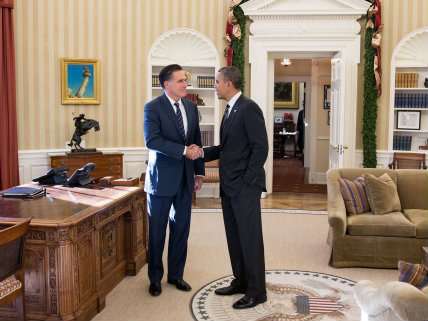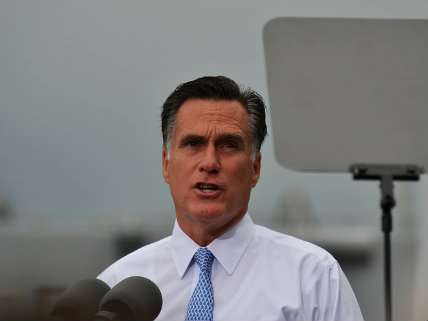The New Progressive Mitt Romney is the Same as the Old Progressive Mitt Romney
Meet the new Mitt, same as the old Mitt.

Mother Jones' David Corn has found a new "progressive champion" in a somewhat surprising candidate: Mitt Romney.
Corn is not exactly a committed Romney booster: He helped tank Mitt Romney's 2012 presidential ambitions by publishing Romney's infamous 47 percent remarks, in what was probably the biggest single scoop of the campaign.
But now Corn is arguing that liberals should embrace the newly "remodeled" former GOP governor of Massachusetts, and "encourage him to return to the political battlefield."
"Romney, apparently seeing the error of his 'severely conservative' ways, has become a progressive crusader," Corn writes. Noting early reports that Romney has hinted he might run to the right of former Florida Gov. Jeb Bush, Corn argues that, in fact, "in public remarks, Romney has been sounding like a born-again lefty."
At an investment management conference in Utah this week, Romney told the crowd that a new-and-improved candidate Romney would focus on climate change, poverty, and education. Yes, climate change, poverty, and education. In a bizarre Freaky Friday sort of way, Romney appears to have been body-snatched—perhaps by the ghost of Ted Kennedy.
Corn isn't wrong that this represents a shift from Romney's last presidential bid, and he's right to flag Romney's remarks in light of initial reports about Romney's likely self-branding strategy.
But this is less a body snatching and more of a reawakening. It's a return to Romney's old political persona—the moderate, non-ideological Rockefeller Republican he played during his days in Massachusetts politics.
During his first year and a half as governor of Massachusetts, for example, Romney worked on a major climate change proposal, one that, much like President Obama's recent executive order, would have included measures to power plants relying on coal and ramp up reliance on alternative energy sources. Whenever the topic came up, Romney insisted that climate change was both real and caused by human activity. "He was the radical in the room" on the topic, one aide told the Los Angeles Times in 2012.
Ultimately, Romney backed away from those ideas as his term as governor ended and he set his sights on the presidency. But this was his first inclination, and he put a lot of energy into it.
Romney was similarly ambitious on education during his tenure as governor, pursuing significant higher ed reforms (that again, ultimately didn't go anywhere) and signing into law a scholarship program, sometimes described as his signature achievement, for high-achieving high-school students. The scholarship program had problems, but the prominence Romney gave it suggest the strength of his interest.

It's true that as governor, Romney didn't place much emphasis on poverty, and, as Corn notes, during his 2012 presidential run, he explicitly said that he's "not concerned about the poor." They "have a safety net"—which he would repair if necessary.
As governor, that's what Romney did. He made a major upgrade to Massachusetts' safety net as governor, designing, promoting, and signing into law a health care overhaul that would become the model for Obamacare. He didn't need to channel the ghost of Ted Kennedy while doing so either, because Kennedy was a major backer of the law who worked closely with Romney to get it passed.
At the signing ceremony, Kennedy appeared on stage with Romney, who praised the Senator, saying that his "work in Washington, and behind the scenes on Beacon Hill, was absolutely essential."
Romney was frequently tagged as an arch-conservative during the 2012 campaign, sometimes by himself. But this was never particularly believable given his governing record. Corn is right to sell his fellow progressives on Romney, but his mistake is suggesting that it's a new development. It's a return to form for Romney, who has always been a committed technocrat, someone who believes in the transformative power of business managers and government planners working together to design social systems.
Obviously Romney hasn't officially announced a run yet, so it's possible that none of this will matter. And given his history of self-reinventions, he could always go another direction.
But if he pursues this approach, would just be dispensing with the awkward, pretend conservative get-up he adopted for the 2012 campaign and returning to his natural form.
Indeed, back in 2002, when Romney was running for Senate, he offered the following self-description: "I'm not a partisan Republican," he said, "I'm someone who is moderate and my views are progressive." Progressives like Corn may just now be discovering that Romney is an ally, but Romney has long known he's one of them.
Here's ReasonTV with 3 reasons Mitt Romney blew it in 2012:


Show Comments (174)